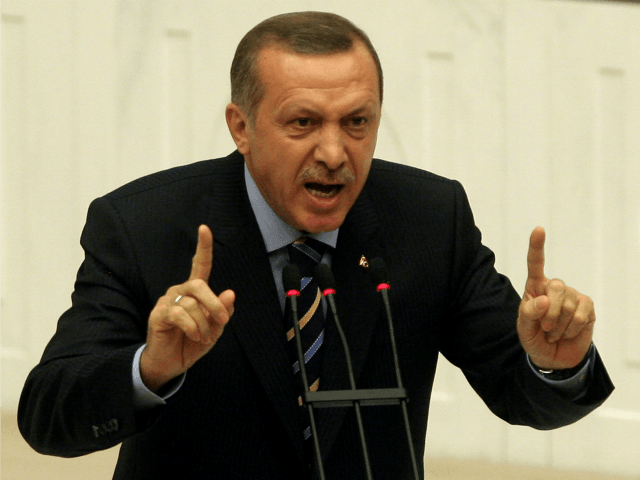Turkish President Recep Tayyip Erdogan said in an address Monday that he will instruct his forces to invade the Iraqi province of Sinjar if it remains a Kurdish stronghold.
“We have told the central [Iraqi] government that the PKK is establishing a new headquarters in Sinjar. If you can deal with it, you handle it. But if you cannot we will suddenly enter Sinjar one night and clear this region of terrorists,” Erdogan said.
During the past few months, Turkish and Iraqi officials have discussed the possibility of joint military action against the Kurdish Syrian People’s Protection Units (YPG/YPJ), a U.S.-allied militia responsible for many victories in Iraq and Syria against the Islamic State (ISIS), including in the “capital” of the “caliphate,” Raqqa, Syria.
The Turkish government claims the YPG are indistinguishable from the Kurdistan Workers’ Party (PKK), a U.S.-designated Marxist terrorist organization. The YPG supports PKK efforts in Iraq against the Islamic State but is a separate entity.
Iraq has also launched its own campaign against the Iraqi Kurdish Peshmerga in Kirkuk, which is not affiliated with the PKK or the YPG and has criticised both publicly.
“If we are friends, you will make it easy for us,” Erdogan continued in his remarks Monday. “We told all this to previous Iraqi central governments as well. If things are furthered prolonged then another ‘Operation Olive Branch’ will be carried out there.”
“Operation Olive Branch” refers to Turkey’s current involvement in the Syrian city of Afrin against the Kurdish militia, whom Erdogan has described as “terrorists.”
During the speech, Erdogan also accused the United States of trying to “deceive” Turkey after refusing to sell arms over concerns about the impact on innocent civilians.
“If we are strategic partners, you will have to respect us and move along with us. You [U.S.] tried to deceive us,” he said. “You sent 5,000 trucks of weapons there. You sent more than 2,000 trucks of ammunition there. We wanted weapons from you to buy with our money, but you did not give any to us. What kind of a strategic partnership or solidarity is this?”
“The U.S. spokesperson makes a comment and says, ‘We are concerned about the situation in Afrin.’ Where were you when we transmitted our concerns to you? Where were you when we said ‘let’s clean the terrorist organization from there?’” he continued.
Sinjar, which is located in Northern Syria and has a large Yazidi population, was previously controlled by the Islamic State (ISIS). The United Nations has described the situation under ISIS as genocide. The terrorist organization conducted at least 10,000 killings and kidnappings and has starved thousands of people to death or sold them as sex slaves.
Sinjar has still not recovered from the Islamic State invasion; most of its infrastructure remains destroyed.
On Monday, the U.S. State Department said it was “deeply concerned” after the Turkish-led assault on Afrin triggered an exodus of Kurdish civilians.
“It appears the majority of the population of the city, which is predominantly Kurdish, evacuated under threat of attack from Turkish military forces and Turkish-backed opposition forces,” State Department spokesperson Heather Nauert said.
“We are also concerned over reports of looting inside the city of Afrin. We have repeatedly expressed our serious concern to Turkish officials regarding the situation in Afrin,” she continued.
Turkish Foreign Minister Mevlüt Çavuşoğlu recently outlined Turkey’s plans to end its military operation against Syrian Kurds by May so that the Afrin region can “quickly embrace stability and civilians can return.”
The offensive, which began in January, has already killed almost 200 people, 42 of whom are Turkish soldiers. The Turkish government claims to have “neutralized” more than 3,000 “terrorists” during the so-called Operation Olive Branch, a count that includes both Kurdish militia and ISIS or al-Qaeda fighters.
Follow Ben Kew on Facebook, Twitter at @ben_kew, or email him at bkew@breitbart.com.

COMMENTS
Please let us know if you're having issues with commenting.